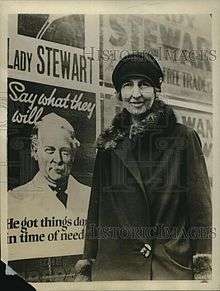Frances Henrietta Stewart

Frances Henrietta Stewart (1883 – 26 September 1962), was a British politician and supporter of Indian nationalism.
Background
She was born as Frances Henrietta Rickards, the daughter of Arthur G. Rickards, KC. She had a private education. In 1906 she married Francis Hugh Stewart, a Calcutta merchant. That year, she returned with him to India, where they lived and raised a family. They had three sons and four daughters. In 1916, her husband was knighted, which gave her the title of Lady Stewart. They returned to Britain in 1919. Sir Francis died in 1921.[1]
Political career
She joined the Liberal Party. She was an advocate of Indian independence and served as Honorary Secretary of the National Indian Association. She also took an active interest in infant and school welfare work.[2] She was Liberal candidate for the Kensington North Division of London at the 1929 General Election. It was not a promising seat for the Liberals who had not won since 1906. She finished in third place;

| Party | Candidate | Votes | % | ± | |
|---|---|---|---|---|---|
| Labour | Fielding Reginald West | 19,701 | 48.4 | +1.4 | |
| Conservative | Percy George Gates | 15,511 | 38.1 | -14.9 | |
| Liberal | Lady Frances Henrietta Stewart | 5,516 | 13.5 | N/A | |
| Majority | 4,190 | 10.3 | |||
| Turnout | 59,500 | 68.5 | -1.1 | ||
| Labour gain from Conservative | Swing | +8.2 | |||
In 1930 she left the Liberals to join the Labour Party.[4] In September 1931, when the Labour Party split over support for the National Government, she followed Labour Prime Minister Ramsay Macdonald and joined the National Labour Party. She attempted to run as a National Labour candidate in Kensington North at the 1931 General Election but when it became clear that supporters of the National Government were uniting behind the Conservative candidate, she withdrew.[5] she continued to support the National Labour Party throughout the 1930s. She did oppose the National Government's Nazi appeasement policy; In early 1939, before war broke out, she advocated the introduction of conscription and increased arms spending to counter the Nazi threat.[6] In 1939 she was awarded the OBE.
References
- ↑ ‘STEWART, Frances Henrietta, (Lady Stewart)’, Who Was Who, A & C Black, an imprint of Bloomsbury Publishing plc, 1920–2007; online edn, Oxford University Press, Dec 2012 ; online edn, Nov 2012 accessed 6 Dec 2013
- ↑ The Times House of Commons, 1929
- ↑ British parliamentary election results 1918-1949, F.W.S. Craig
- ↑ Western Morning News, 21st February, 1930
- ↑ Dundee Courier, 16th October, 1931
- ↑ "Good citizens and good neighbours. National Labour speaker and ARP workers". The Glasgow Herald. 27 May 1939. p. 9. Retrieved 13 March 2016.